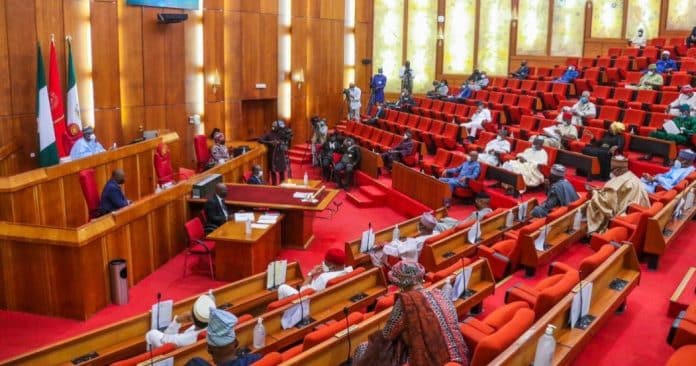The House of Representatives Committee on Health Institutions has pledged the 10th National Assembly support at efforts aimed at reshaping healthcare delivery in Nigeria.
The healthcare system in Nigeria is in need of intervention by critical stakeholders in the sector.
The House of Representatives Committee on Health Institutions has pledged the 10th National Assembly support at efforts aimed at reshaping healthcare delivery in Nigeria.
The Chairman of the committee, Rep. Amos Magaji, made the pledge on Tuesday during an oversight function by members of the committee to the National Hospital, Abuja.
Magaji, who decried the level of healthcare delivery in Nigeria, said that the healthcare system was in need of intervention by critical stakeholders in the sector.
“So the health care system needs urgent intervention, some were done during COVID which exposed the Nigeria healthcare system.
“Before COVID, so many hospitals didn’t even have an oxygen plant. So we are gradually growing though we are not where we want to be. We will do everything to support equipping our hospitals.
“Whether through Public-Private Partnerships arrangements or procurement or the ones we will get through intervention because even the budget for health is very poor.”
He also said that the legislature would ensure that human resources for health were looked into. According to him, long and short-term plans will be made to curb the issues, beginning by making the process of enrolment into medical school easy.
“We are going to legislate, engage to see things that will make the practice of medicine in Nigeria attractive, competitive, and also good so that others from different countries will come to practice medicine in Nigeria.”
On the issue of medical tourism, Magaji said that everything must be done to reverse the trend. He said: “We must get people to start coming from different parts of the world and reduce the number of Nigerians going there.
“Let it be that Nigerians go to seek medical intervention abroad by choice and we will be glad to have our hospitals functional and have our systems working.”
Magaji, who was displeased with the financial state of the hospital with regards to the Internal Generated Revenue it recorded in 2022 said that the hospital should be able to run on its own.
“The running cost of this hospital is in billions, reasonably why should one put 10 to 13 billion Naira and at the end what you are generating is not up to two billion Naira?
“I know that the hospitals are set up to provide services but it is not actually free.
“I am happy that the Chief Medical Director (CMD) has also looked at the areas of leakages and also began to block those areas.”
He urged the hospital to get fully digitalized and get their system automated as it was the way to go to deliver good service. Magaji also said that to address the issue of patient’s inability to pay for services rendered, all Nigerians should have health insurance.
On his part, Rep Adedayo Adesola said that legislation could help with ensuring that the hospital’s cancer care and trauma units were funded.
“If we sit down together and we brainstorm, we can find a way where the Federal Government pays the bulk of those two items.
“I am also of the opinion that people should not pay import duty for drugs like cancer, either for old or young people.
“Even people who have kidney transplants, drug rejection, and anti-drug rejection medication should also be tax-free.”
According to him, 20% of Nigerians have problems with their kidney translating to about 20 million people.
“That is a huge number. So if that affects a large number of our people we should find a way to support them.
“So I think we just need to work together to be able to bring in legislations that will help you and then we must be able to find a way to detect those who cannot actually pay.
“There are some people that are not able to pay and I’m of the opinion that it is the duty of all of us to support the poor and the vulnerable, particularly when it relates to health.”
The CMD, Prof Raji Mahmud, while defending the hospital’s inability to generate the expected funds, said that at the trauma center, patients are treated without any initial deposits for the first 24 to 48 hours and the amount spent on one individual runs into millions.
“When they are asked to go to the ward and asked to pay what they owe they either say they don’t have or some even die so we lose money every day.
“Also, cancer care gulps millions of Naira but we have never sent anyone away so you realize that whatever we generate from IGR we spend on some other drain pipes like the trauma center and cancer care, so it is really hurting us.”
Mahmud, however, said that it was absolutely necessary to increase the hospital’s IGR, adding that it had in the last few months blocked some leakages. He added that about 98 percent of the medical records had been recovered electronically.
“We are also thinking out of the box. There are some of these facilities that eventually once we are able to stabilise them we may commercialise some aspects for those who can afford it.
“This is so that we open a new window for them to access but we will not close down that other window for Nigerians who are not so rich and also those who are on National Health Insurance so that it will also be open to everyone.”












